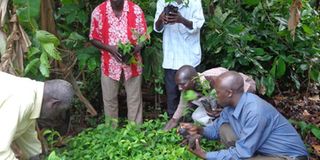Prime
Kayunga farmers resort to agroforestry to combat drought

Kitimbwa-Nezikokolima farmers group at one of their tree nurseries. As a way of combating hunger and drought, they plan to raise about 100,000 tree seedlings including fruit trees in the next three years. PHOTO BY BRIAN SSENOGA
Coffee, maize and rice growers plus beekeepers in Kitimbwa Sub-county, Kayunga District have embarked on a project to conserve, protect and restore destroyed natural forests.
They have combined their efforts under their Nezikokolima-Kitimbwa Produce and Marketing Association
Joseph Eyoti, the general secretary, told Daily Monitor that the project is a response to long dry spells, which have hit the area, leaving several families without food and water. He attributed the condition to the rampant cutting down of trees for charcoal burning.
He said “Kayunga never had such long dry spells as we have had the last two seasons. We decided to start planting trees not from where they have been cut but even in our gardens.”
Hakim Mutumba, the group chairman, revealed the 341-member association had raised a total of 34,100 trees of musiizi (Maesopsis eminii) in three nursery beds. Each member will be given 100 seedlings for free, and the target is to raise at least 15,000 seedlings by the end of next planting season.
“We have fruit trees but they are also not performing to expectations due to lack of food and because of drought people resort to theft of the available fruits. So we want each member to plant a forest, which will not only support in rainmaking but also our bee keeping projects,” Mutumba added.
Realising the good cause, the group has received support from Self Help Africa through Kayunga District Farmers Association (KDFA).
Johnson Nuwagaba, the agriculture and livelihood programme coordinator at Self Help Africa, notes that on top of growing fast and yielding nice timber, musiizi does not compete with crops.
“It increases soil fertility, allows intercropping and has a lot more other benefits. In addition to fruit trees, farmers should start planting other trees in their gardens as a strategy for environmental conservation,” Nuwagaba said.
Though there are no vivid statistics, information from KDFA indicates that deforestation is on the rise. While there have been constant efforts to promote agro-forestry—including free districbution of non-fruit trees to farmers, the efforts have yielded lean results.
“Despite being near Lake Kyoga and River Sezibwa, the conquences of poor farming methods and environmental degradation have always affected Kayunga District,” Nuwagaba observed.
“Farmers should be supported in this endeavour. They also should embrace agro-forestry as a mitigation measure against the effects of c limate change.”




